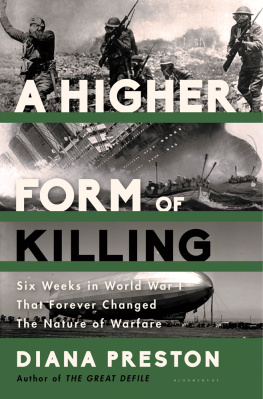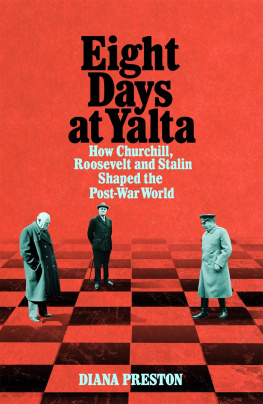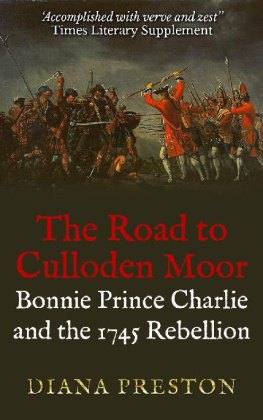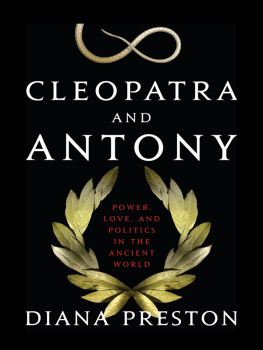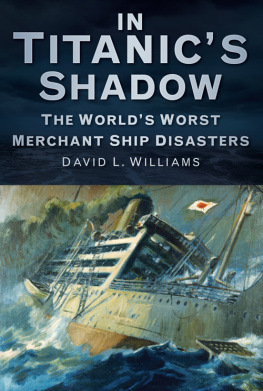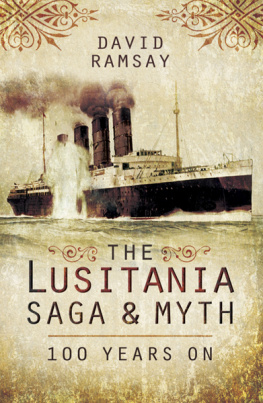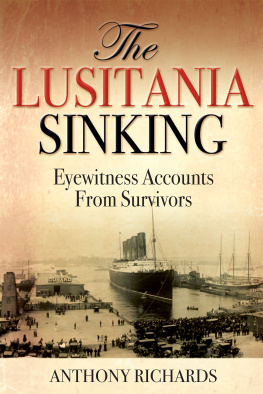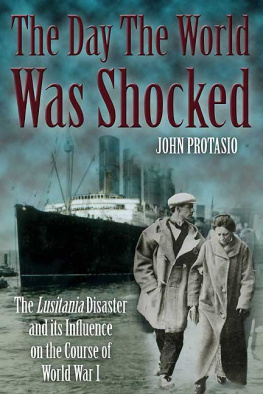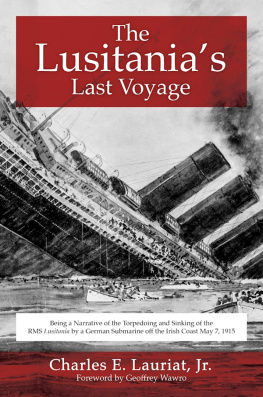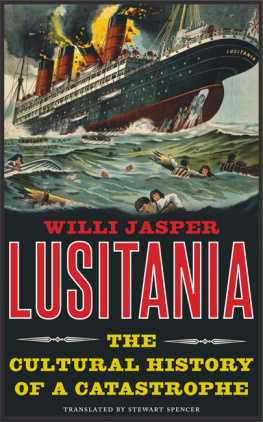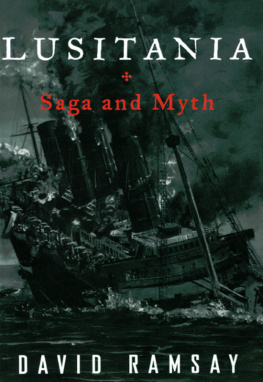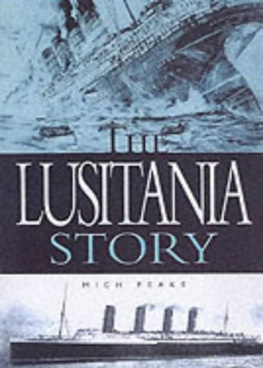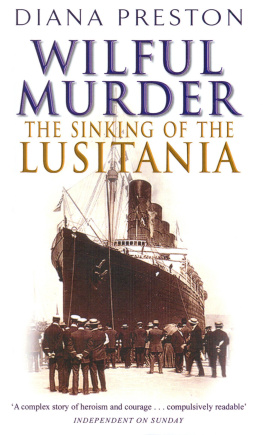
Contents
Newspaperman witnessing departure of RMS Lusitania from Liverpool on her maiden voyage, 7 September 1907:
Lit up from stern to stern with lights glinting from the rows of portholes that marked her numerous tiers of decks, the mammoth proportions of the Lusitania were emphasised by the illuminations, and the vessel presented a magnificent spectacle as she began to move away. The demonstration reached its climax when the vast multitude broke out with Rule Britannia. This song was taken up by the crowds on the Cheshire side of the river and sung until the ship, with her 3,000 passengers, had passed...
Oliver Bernard, Lusitania Passenger, 7 May 1915:
All lights were out, the passage in darkness and entirely deserted... I fell several times, once rolling down a side passage in grasping at a handrail which wasnt there... and at last reached my own cabin... I knew a lifebelt was tucked away on top of the wardrobe and felt my way for it; the wardrobe leaned over on me but I climbed the berth and dragged the lifebelt out, then made for the stairs... was I going to be drowned like a rat in the dark?

On 7 May 1915, without warning and against the international law of the time, the German submarine U-20 torpedoed the British Cunard liner RMS Lusitania off the southern Irish coast. She sank in just eighteen minutes with the loss of 1,198 of the 1,959 aboard, including 128 citizens of the then neutral United States. What occurred off the Irish coast that warm spring day of 1915 was a personal tragedy that ranks with the Titanic, lost three years earlier. The political fall-out was momentous, triggering a sequence of events that two years later would bring the United States into the war. US troops would advance into battle shouting, Remember the Lusitania. It would be said that although the ship had failed to deliver her 200 American passengers safely to Liverpool in 1915, in 1917 and 1918 her ghost carried 2 million US troops to the Western Front.
Through the voices of victims and perpetrators, politicians and diplomats, the public and the press, this is the story of how one ship altered the course of history.
In May 1899eight years before RMS Lusitania made her maiden voyage108 delegates from 26 countries, including France, Germany, Great Britain, Russia and the United States, met at a conference outside The Hague in the Netherlands. The purpose of the conferenceheld at the suggestion of Tsar Nicholas II of Russiawas twofold: to discuss how to prevent war from breaking out in the first place, and how to conduct it in a civilised way if it did.
Several delegates, notably British Admiral Jacky Fisher, the future father of the Dreadnought battleship, and the American Captain, later Admiral, Alfred Thayer Mahan were openly sceptical about these goals. So too would have been German Admiral Alfred von Tirpitz, had he attended.
With such powerful opposing voices counter-acting the pressure for even stricter rules for naval warfare against commerce, conference delegates left unaltered the time-honoured body of custom and practice known as the Cruiser Rulesparts of which dated from Tudor timeswhich governed the conduct of war against merchant shipping. These rules prohibited the sinking of merchant vessels regardless of nationality without warning. Instead, merchant ships had to be stopped and searched for contraband. Only if contraband were discovered could they be seized or sunk, and then only after their crews had been allowed to take to the boats.
Britain and Germany went on to engage in a naval arms race. Nevertheless, after further debate over subsequent years at a second Hague conference and elsewhere, the Cruiser Rules were confirmed as the international law on commerce raiding and remained in force in August 1914. This was despite advances in the design of a new weapontorpedo-carrying submarineswhich would in practice find it difficult to uphold the rules without grave danger to themselves. The Hague conferences did, however, agree several important conventions governing other aspects of warfare.

Andrew White, Head of the US Delegation to the First Hague Conference:
Probably since the world began never has so large a body come together in a spirit of more hopeless scepticism as to any good result.
Admiral Jacky Fisher, British Naval Delegate to the Conference:
The humanizing of war? You might as well talk about humanizing Hell! The essence of war is violence! Moderation in war is imbecility!...
I am not for war, I am for peace. That is why I am for a supreme Navy. The supremacy of the British Navy is the best security for the peace of the world...
If you rub it in both at home and abroad that you are ready for instant war... and intend to be first in and hit your enemy in the belly and kick him when he is down and boil your prisoners in oil (if you take any)... and torture his women and children, then people will keep clear of you...
Suppose that war breaks out, and I am expecting to fight a new Trafalgar on the morrow. Some neutral colliers try to steam past us into the enemys waters. If the enemy gets their coal into his bunkers, it may make all the difference in the coming fight. You tell me I must not seize these colliers. I tell you that nothing that you, or any power on earth, can say will stop me from sending them to the bottom, if I can in no other way keep their coal out of the enemys hands; for to-morrow I am to fight the battle which will save or wreck the Empire. If I win it, I shall be far too big a man to be affected about protests about the neutral colliers; if I lose it, I shall go down with my ship into the deep and then protests will affect me still less.
Captain Alfred Thayer Mahan, US Naval Delegate to the Conference:
... control of the sea, by maritime commerce and naval supremacy means predominant influence in the world... [and] is the chief among the merely material elements in the power and prosperity of nations... The object of war is to smite the enemy incessantly and remorselessly and crush him by depriving him of the use of the sea.
Kaiser Wilhelm II of Germany:
(Before the conference)
[Tsar Nicholas] has put a brilliant weapon into the hands of our democrats and opposition. Imagine a monarch dissolving his regiments and handing over his towns to anarchists and democracy... Ill go along with the conference comedy but Ill keep my dagger at my side during the waltz.
(And on its conclusions)
I consented to all this nonsense only in order that the Tsar should not lose face before Europe, in practice however I shall rely on God and my sharp sword! And I shit on all their decisions.
British Rear-Admiral Sir Arthur Wilson, VC, Controller of the Navy, on submarines in 1901:
Underwater weapons, they call em. I call them underhand, unfair and damned un-English. Theyll never be any use in war and Ill tell you why: Im going to get the First Lord to announce that we intend to treat all submarines as pirate vessels in wartime and that well hang all the crews.
Admiral Jacky Fisher in 1904:
I have not disguised my opinion in season and out of season as to the essential, imperative, immediate, vital, pressing, urgent (I cannot think if any more adjectives) necessity for more submarines at once... I dont think it is even faintly realised the immense impending revolution which the submarine will effect as offensive weapons of war.
Next page


